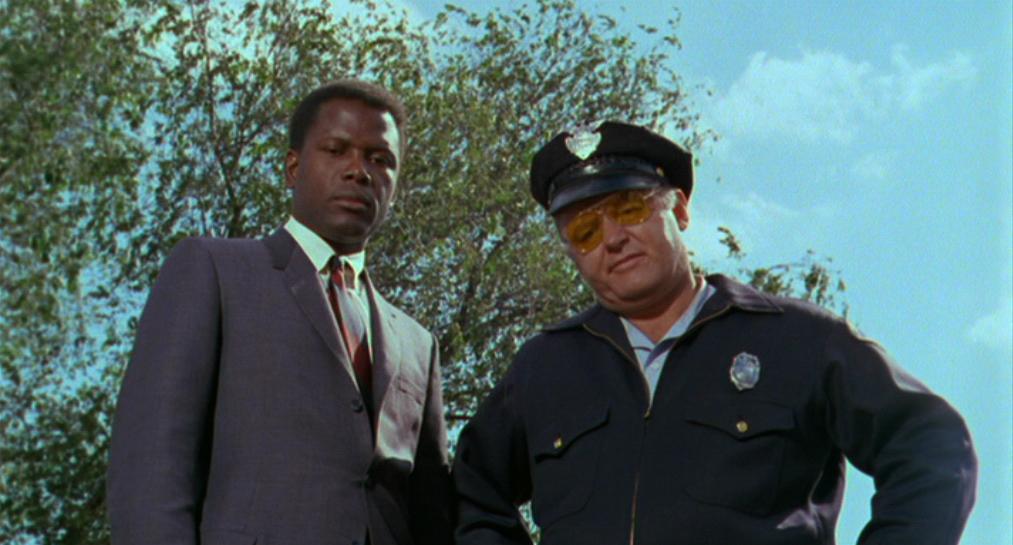← Back to Reviews
in
#117 - In the Heat of the Night
Norman Jewison, 1967

When a wealthy industrialist is killed in a small Mississippi town, the town's bigoted white sheriff is forced to team up with a black detective who is passing through town in order to solve the mystery.
While it's all too easy to dismiss the Best Picture winners that trade in schmaltzy drama designed to play to the Academy's heavily-telegraphed weaknesses, it's not like the more surprising Best Picture winners are automatically much better. These are the films that are more unconventional winners in that they tend to invoke specific genres and come across as just really, really good examples of said genres rather than just obvious attempts at winning acclaim. In the Heat of the Night is a murder mystery but the actual whodunit is a distant second to the intense atmospherics provided by the heavily prejudiced characters and setting. Though it's arguably dated in some respects (at one point Sydney Poitier's homicide expert examines the victim's corpse with his bare hands before asking another character where he can wash his hands, which seemed more than a little odd to a modern viewer like me), for the most part the '60s setting is an integral part of the narrative. Poitier plays a man who is clearly incensed by the dual inconvenience of the racist locals and the unsolved murder but keeps his irritation down to the subtlest of outbursts. Rod Steiger gets a fair bit of depth as Poitier's opposite number, a white sheriff who just wants to keep the peace while solving the crime as quickly as possible (and therefore sees Poitier's presence as an obstacle), but he still manages to retain some sympathy as he and Poitier warm up to each other (because what's a Best Picture winner without a couple of polar opposites learning to accept each other's differences?). The rest of the cast is serviceable (hey, look, it's Warren Oates, definitely an underrated character actor if ever there was one) but these two really do make the film something special.
While a narrative charged by race relations can be handled rather badly, in this film's context it makes sense and works wonders, which is just as well considering how thin the actual murder mystery ends up being. Some appropriately gritty cinematography courtesy of Haskell Wexler combines with Quincy Jones' funky yet slightly dangerous score to set a great mood across the course of the film. Though it may end rather abruptly, it's still a solid detective movie aided considerably by the chemistry between its leads.
Norman Jewison, 1967

When a wealthy industrialist is killed in a small Mississippi town, the town's bigoted white sheriff is forced to team up with a black detective who is passing through town in order to solve the mystery.
While it's all too easy to dismiss the Best Picture winners that trade in schmaltzy drama designed to play to the Academy's heavily-telegraphed weaknesses, it's not like the more surprising Best Picture winners are automatically much better. These are the films that are more unconventional winners in that they tend to invoke specific genres and come across as just really, really good examples of said genres rather than just obvious attempts at winning acclaim. In the Heat of the Night is a murder mystery but the actual whodunit is a distant second to the intense atmospherics provided by the heavily prejudiced characters and setting. Though it's arguably dated in some respects (at one point Sydney Poitier's homicide expert examines the victim's corpse with his bare hands before asking another character where he can wash his hands, which seemed more than a little odd to a modern viewer like me), for the most part the '60s setting is an integral part of the narrative. Poitier plays a man who is clearly incensed by the dual inconvenience of the racist locals and the unsolved murder but keeps his irritation down to the subtlest of outbursts. Rod Steiger gets a fair bit of depth as Poitier's opposite number, a white sheriff who just wants to keep the peace while solving the crime as quickly as possible (and therefore sees Poitier's presence as an obstacle), but he still manages to retain some sympathy as he and Poitier warm up to each other (because what's a Best Picture winner without a couple of polar opposites learning to accept each other's differences?). The rest of the cast is serviceable (hey, look, it's Warren Oates, definitely an underrated character actor if ever there was one) but these two really do make the film something special.
While a narrative charged by race relations can be handled rather badly, in this film's context it makes sense and works wonders, which is just as well considering how thin the actual murder mystery ends up being. Some appropriately gritty cinematography courtesy of Haskell Wexler combines with Quincy Jones' funky yet slightly dangerous score to set a great mood across the course of the film. Though it may end rather abruptly, it's still a solid detective movie aided considerably by the chemistry between its leads.
